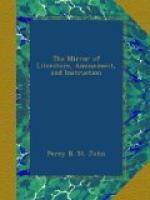Having dined with the King at Kensington, he was prevailed on to see the ceremony of his Majesty passing four bills; but, it appears from a note of Lord Dartmouth, that here, as in the Commons, he avoided going into the house. His Lordship says, “He had a great dislike to being looked at, but had a mind to see the King in parliament; in order to which he was placed in a gutter upon the house-top, to peep in at the window, where he made so ridiculous a figure, that neither king nor people could forbear laughing, which obliged him to retire sooner than he intended.”
From the same authority we learn that Peter was, at another time, placed in an awkward situation. “The King made the Tzar a visit, in which an odd incident happened. The Tzar had a favourite monkey, which sat upon the back of his chair; as soon as the King was sat down, the monkey jumped upon him, in some wrath, which discomposed the whole ceremonial, and most of the time was afterwards spent in apologies for the monkey’s misbehaviour."[10]
[10] Lord Dartmouth.—Note
in Burnet’s History of his own
Times.
The Tzar is said to have paid a visit to the University of Oxford; but not a trace appears on any of the records of that university of his having ever done so. His body physician, Posnikof, who stayed in England some months behind his master, is, however, known to have been there. Mr. Wanley writes thus, from London, to Dr. Charlett;—“I will wait on the doctor (Posnikof,) and if you had been pleased to have given me orders, I would have been at Oxford before now, for his sake, and returned hither with him again. His master (the Tzar) gave the King’s servants, at his departure, one hundred and twenty guineas, which was more than they deserved, they being very rude to him; but to the King he presented a rough ruby, which the greatest jewellers of Amsterdam (as well Jews as Christians) valued at ten thousand pounds sterling. ’Tis bored through, and when it is cut and polished, it must be set upon the top of the imperial crown of England."[11]
[11] Ballard’s Collection.
Bodleian. With plain downright
simplicity and free from all ostentation
Peter carried
this valuable ruby to the king in his waistcoat
pocket,
and presented it wrapped up in a piece of
brown paper.
He was introduced to the archbishop of Canterbury, at his palace of Lambeth, and having expressed a desire to see the different churches of the capital, and to observe the mode in which the service was conducted, the archbishop recommended bishop Burnet to gratify his curiosity in this respect; and to give him all the information, of which none was more capable, that he might require on ecclesiastical matters. From this dignitary of the church we have some information respecting the manner and appearance of this extraordinary character.




